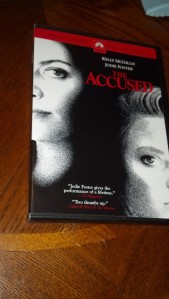By rough estimate, I own 339 movies on DVD or Blu-ray, and it’s been a long time since I’ve watched a lot of them. Since I have a bit of time on my hands these days, I decided to take a few weeks to work my way through them all. Then my husband pointed out one movie a day would be nearly a year, so I revised my project. Between now and June 10, 2015, I will be watching and writing about each and every one of the movies I own, in the order they are arranged on my shelf (i.e., alphabetically, with certain exceptions). No movie will be left unwatched (even the most embarrassing, ridiculous titles are subject to scrutiny), however, I will not be discussing any other discs I might own, such as TV series, sporting events, or live concerts as part of this endeavor. I welcome your comments, your words of encouragement and your declarations of my insanity.
Movie #6: The Accused
This is going to take me a while.
I have seen this movie many, many times, yet the visceral reaction it brings about in me never diminishes. I shake, my heart races. I’ve bitten my nails to the quick every time. This movie packs one hell of an emotional gut punch.
The Accused tells the story of Sarah Tobias (Jodie Foster), a working class woman with bad habits and a shady past who is brutally gang raped in the back room of a bar, on a pinball machine, by three men holding her down, while other men in the room cheered and goaded them on. The movie begins in the immediate aftermath, as a witness is calling 911 from a pay phone across the street just when Sarah runs screaming from the bar, clothes torn, visibly panicked. At the hospital, she is coldly — clinically — photographed and examined. She is severely bruised all over her body. She has almost no voice left at all; she lost it screaming and from the men holding her by the throat. She answers the nurses questions quietly and succinctly, emotionless with shock. But she’s a fighter, this one. When District Attorney Katheryn Murphy (IMDb spells it Kathryn, but the door to her office clearly adds the “e”) played by Kelly McGillis asks Sarah what she wants out of this prosecution, she spits out that she wants them to go away forever.
One of the things I like about this movie is that it exposes the multiple, various obstacles that arise with rape cases. Sarah Tobias was drunk. Sarah Tobias was stoned. Sarah Tobias had had a fight with her boyfriend and made an off-handed remark about wanting to have sex with somebody else at the bar just to spite him. But none of that matters, as much as the attorneys (on both sides) and the news reports and the people in the bar say that it does, because Sarah Tobias was raped. The tone of the film is very clear on that point, and Foster’s (well-deserved) Oscar-winning performance really hammers it home. She’s argumentative and defensive at every turn, because no matter what anyone else says, she knows what happened to her was wrong, and that she never once deserved it or asked for it to happen.
The justice system being what it is, there are long discussions at the District Attorney’s office about what’s provable and what’s winnable, and eventually a deal is struck to convict the three perpetrators of reckless endangerment — a felony that absurdly carries the same sentence as the second degree rape charge, but with none of the weight. Sarah is furious at the deal, and accuses Katheryn of betraying her by not letting her tell her story. After giving herself the At-Home Haircut of Female Empowerment, Sarah kicks out her boyfriend and tries to start over. But one day at the record store, Sarah encounters one of the men who watched her attack, who cheered and chanted and clapped as it happened. Once he recognizes her, he harasses her mercilessly in the parking lot as she tries to lock herself in her car and drive away, even going so far as to block her exit with his truck. When he shouts at her, “Wanna play pinball,” Sarah, in full panic attack, rams her car into his. Twice.
At the hospital, Katheryn comes to see her and finds out, from Sarah and from her tormentor, what happened in the parking lot (his story being significantly different from hers, of course, insisting that Sarah is crazy and that the last time he saw her she was “putting on a sex show” and that the next time she does, he’ll be right there to cheer her on again). It is at this point that Katheryn decides to prosecute the instigators for criminal solicitation — inciting the rape to occur. She tracks down and finds the witness who called 911, a fellow fraternity brother and friend of one of Sarah’s assailants, and he will be the key witness in the trial.
In college I took a Women in Film course, and this was one of the movies discussed. The professor said that it wasn’t actually the feminist statement everyone thought it was, because Sarah’s salvation (a guilty verdict for the three instigators, getting the rape on record and ensuring the three attackers will spend the full five years of their sentence in prison) was dependent on the word of a man, that it would be his testimony, and not Sarah’s own, that would decide the case. I’ve thought about this statement a lot over the years; it never felt quite right, really. Tonight I finally realized why.
It’s true that Sarah’s own actions and past are looked at unfavorably, that her friend Sally’s testimony of Sarah’s state of mind only hurt her case, and that ultimately the testimony of the witness Kenneth Joyce will be most important. And I won’t deny that it’s problematic that even in this movie that flouts and rejects virtually every preconception about rape, a man’s word carries more weight than the female victim’s. But that’s problematic in the real world too, and it’s still prevalent in the real world, nearly 30 years since this movie was made. Men accused of rape are often asked to be given the benefit of the doubt. You will find no shortage of people touting his right to be considered innocent until proven guilty. Suspicion will be cast on his accuser. And while everyone is expected to treat this man as innocent, the flip side of the coin is that everyone wonders if the woman isn’t perhaps lying, or exaggerating, or trying to “get” something from him (though I’m never quite clear on what that something is supposed to be). “Presume he is innocent” means “presume she is a liar.” And that’s why I think it’s actually important — vital — that the key testimony in the criminal solicitation trial come from a man; in short, men have to take up this cause as well.
Women can talk about personal safety and rape and the horrors associated with sexual harassment and assault (having been a rape crisis volunteer several years ago, I’ve heard perhaps more stories than most), but until men start speaking up as well, nothing in our culture — our national values — will really change. Not because men’s voices are more important than women’s, but because men have a vested interest in dismantling our rape culture as well. It’s not enough to walk away from sexist banter, or to quietly disapprove of inappropriate behavior. They have to intervene, to say this is wrong, to set the tone. Just as much as women do.
One of the defense attorneys in the movie, as he’s giving his summation, says that the only reason Kenneth Joyce is testifying is because he himself feels guilty for not stopping the rape, for not helping Sarah. He says that, in truth, Kenneth Joyce is the guilty one. And he’s right. Kenneth Joyce is guilty. Not of rape, and not of criminal solicitation, or any other crime in the eyes of the law, but he is guilty of allowing it to happen, as is every other person in that back room who watched, cheering or no. As is any man who witnesses sexism or harassment or sexual assault or even words or actions that perpetuate the idea of women as objects, as prizes to be won, as lesser beings subjected and submissive to the designs of a man, and says nothing to argue against it. It is just as much their responsibility to fight these ideas as it is a woman’s.
It may be a bold statement, but it’s true. And to me, that’s the real message of The Accused — a movie that’s maybe a little further ahead of its time than anyone imagined.


I love this!
I’ve thought about doing that myself with my own movies. I have at least 100 still in their packaging because I haven’t gotten around to watching them yet and I find them hard to resist buying. I’m more likely to watch the IMDB top 250 movies one per day and writing sniper reviews. Looking forward to your future posts 🙂
Thanks for your support! I am really enjoying watching and revisiting them all.